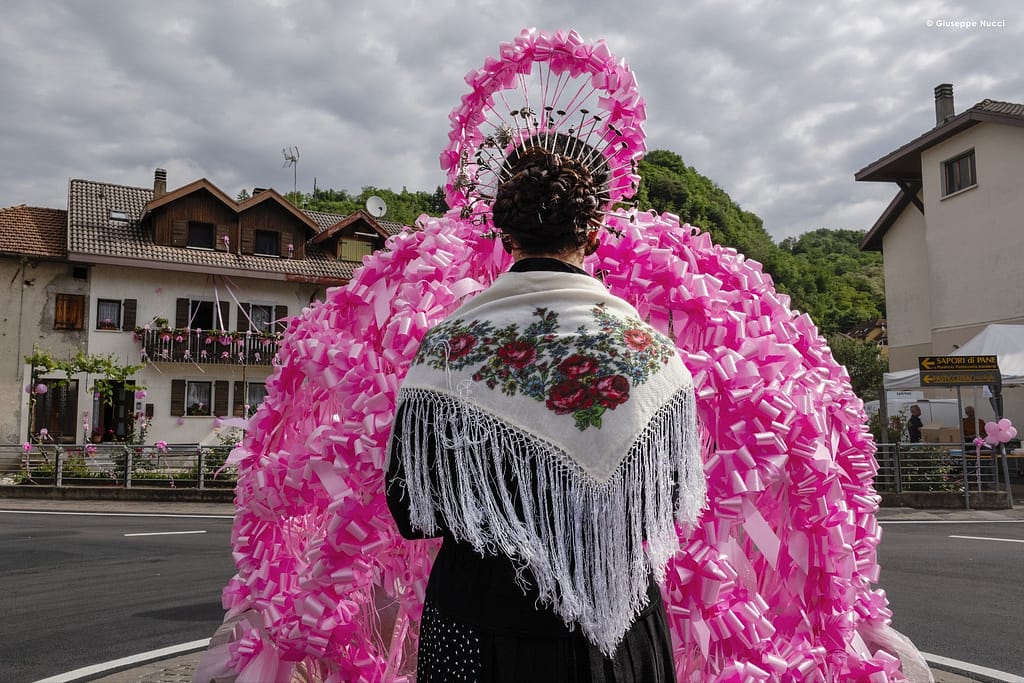[[{“value”:”Image: Faema
How Faema brought together cycling and coffee communities at Giro d’Italia through the lens of a new photography project.
On a sunny afternoon in May 2024 in the Italian town of Venaria Reale, northwest of Turin, spectators gathered in anticipation as the historic Giro d’Italia cycle race commenced.
As the crowds arrived in their droves, the Faema X60 and X20 coffee machines took their positions at 21 designated layover locations along the route, representing the brand and its long history with the iconic race.
“Faema first connected with the Giro d’Italia in the 1950s and then again in the 1970s when it had its own Faema team of cyclists. Some 50 years later, we returned to sponsor the race in 2021. The event gives us a great opportunity to bring our coffee machines to the cyclists and people attending the event. It is also our chance to reconnect with our history with the event,” says Marta Kokosar, Global Communication and Sustainability Director of Cimbali Group.
“In 2024, we wanted to pay homage to the people we have met over the years at the race, so we created a project to give back in the form of art. We partnered with German photo company Leica to produce a photographic exhibition that celebrated people and the beauty of everyday life.”
The exhibition was held at the start of September at the Leica Gallery in Milan’s Piazza Duomo and displayed more than 50 photos of the race. It also included images of the people who came to enjoy a coffee at the Faema booths.
“We wanted Faema to become the lens through which we narrate the Giro d’Italia. The aim of the project was to capture the social soul of people, the beauty of the Italian landscape, and to create a tale of sharing,” says Kokosar.
For the project, Leica chose a team of four certified photographers who took pictures during the race. Their task was to capture the story of the people of the Giro d’Italia and the passion that unites them.
“The photographers covered almost all the layovers and stages of the race. We chose the pictures based on the photographers’ different artistic styles to give variety to the work and to create a diverse collection,” she says.
According to the brand, the exhibition not only captured moments of the race but also showcased the connection between the cycling and coffee communities.
“There has always been a great interrelatedness between coffee and cycling and this is something the project really encapsulates. Both cultures are based on the idea of coming together and enjoying moments with people,” says Kokosar.
“We wanted Faema to become the lens through which Giro d’Italia tells its story, just as friends share stories over coffee. The project is all about how coffee and cycling can demonstrate the element of human connection while participating in these activities.”
Image: Faema
Faema’s E61 and E61 CULT coffee machines were also showcased at the exhibition and, according to Kokosar, represented the company’s evolution in espresso technology.
“Our most iconic machine is the E61, which was designed and built in 1961, and was the first to be used at the race. Therefore, it is recognised as our coffee machine that relates most to the cyclists. It was very significant for us to have it at the Giro d’Italia this year and as part of the project,” she says.
“Having the new E61 CULT and the fully automatic range side by side brings together our heritage and our attention to market needs. We were delighted to offer coffee with our traditional and fully automatic machines. People came to check it out and to watch the start of the race, so it was nice to share the excitement and a cup of coffee with them.”
The E61 CULT is the latest addition to Faema’s E61 range. The one-group espresso machine retains the same design and high-quality materials of the Faema line, while also offering customers a consistently high-level coffee experience outside the traditional café environment.
Along with giving back to its customers through the project, the team at Faema also supported the wider coffee community by collaborating with World Bicycle Relief.
“We decided to work with World Bicycle Relief, a not-for-profit association that operates around the world,”
says Kokosar.
“It works with developing countries, which are often coffee producing countries, and creates bicycle distribution programs to aid poverty relief. The programs supply those who have no form of transport
with bikes so they can do life-changing things such go to school, provide medical assistance, or attend their jobs.
“The act of giving back to these countries that produce coffee is another way for us to thank the community. The producers of coffee are the reason why we are here and why we have been in business for 80 years. To be able to help improve the life of these people is really important and another key objective of this project.”
For its 80th anniversary next year, the company is looking forward to celebrating its achievements and planning future projects as it continues its journey in espresso machinery.
“This project is bringing to light some of the values we would like to highlight as part of our anniversary. We will continue to produce traditional machines that we believe are instrumental to the barista in terms of expression, and further delve into the world of automatic machines to provide for our commercial audience,” says Kokosar.
“We also aim to continue with our commitment to sustainability in all our future endeavours. As an international company we are very aware of our impact on the environment. Over the years we have worked hard to implement practices to counteract this and to reduce our carbon footprint in any way we can. These efforts are heavily embedded in our upcoming plans and something we are dedicated to working on.”
The post Faema makes its mark at Giro d’Italia appeared first on Global Coffee Report.
“}]]


